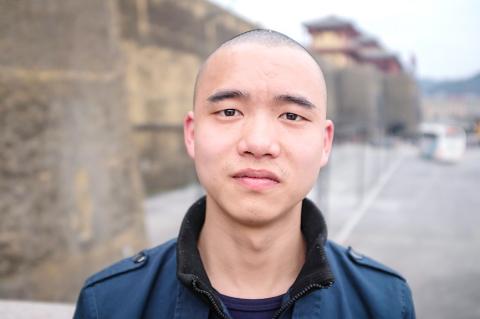Fed up with the drudgery of his sales job in southern China, Lu Qi quit and traveled 1,000km north to one of the country’s biggest film studios with hopes of making it in movies.
That dream remains a work in progress for Lu and thousands like him who eke out a precarious living as extras at Hengdian World Studios.
Just as moviegoers use film to escape reality, so too do many of Hengdian’s army of more than 6,000 extras.

Photo: AFP
“I failed so many times [in sales] and haven’t made much progress,” said Lu, his head shaved bald save for a knit cap keeping it warm.
“Most people here have no degrees, skills or relations. [We] can’t do any business either, so we are just here to escape the reality and the competition out there,” the 24-year-old added.
Hengdian, in Zhejiang Province, was once a poverty-stricken town amid rugged hills, but in the mid-1990s the investment firm Hengdian Group expanded into movies.

Photo: AFP
It bulldozed the landscape and erected the mammoth studio complex, which now claims to be the world’s largest film and TV shooting base.
Sometimes dubbed the “Hollywood of the East” or simply “Chinawood,” local media reported more than 70 percent of China’s films and TV shows have been at least partly shot on a 330-hectare site.
Sets range from ancient palace complexes that can accommodate casts of thousands to contemporary mansions and modern green screens.
“You can complete a Beijing-Hong Kong trip in one day,” Hengdian tour guide Wu Rongrong said as she stood before a life-sized reproduction of Beijing’s Forbidden City while gesturing toward a replica of an old Hong Kong street complete with opium bars.
The studio has been the backdrop for Chinese blockbusters such as Hero (2002) and has been graced by A-listers like Jackie Chan (成龍) and Fan Bingbing (范冰冰).
Its growth has outrun the local supply of manpower.
“At first, we recruited mostly locals as extras. Now the majority of them come from out of town,” said Zhou Fenglai, a Hengdian town official who deals with performer management.
An estimated 6,000 to 8,000 people are on hand daily to serve as extras at Hengdian.
Lian Chunyu grew up on horseback on the plains of Inner Mongolia, before parlaying that experience into work as a Hengdian stunt rider for eight years. Even though his face is never seen in movies, it is still a thrill to be part of it.
“It would be difficult for me to get used to doing something else after this,” he said.
Lu, who spends a few months a year in Hengdian and the rest at home in Guangdong Province, checks his WeChat group messages each morning for studio work, usually finding something daily.
Lu and Lian make about 100 to 200 yuan (US$15 to US$30) per day, enough to cover rent and meals, while those with more acting experience can make more.
Male extras get an additional 40 yuan each time they shave their heads — partly to make sure there is ample manpower for often used scenes requiring the Manchu-style shaved head and braided queue.
As well as the extra cash, Lu also likes that such a specific look rules him out of military roles.
“It’s very uncomfortable running around in the mountains wearing armor and being blown up,” Lu said, comparing it to work as a “coolie.”
Between scenes, Lu shoots videos of himself with props and costumes, which he uploads to social media.
Many of the extras do live online broadcasts and performances, making additional money via digital payments from their followers, he said.
One downside: being barked at and herded like cattle.
“Most film crews are really terrible, cursing people and such. That’s despicable. The bigger the production team, the worse they are,” said Wang Xiaopin, a 47-year-old extra from Henan Province.
“It doesn’t matter how well you perform. In their eyes, you will always be unqualified,” he said.
China’s entertainment sector has blossomed in recent years as the government looks to build up the domestic industry and replace imported foreign content with homegrown fare.
However, many projects have been put on hold after the central government last year began cracking down on alleged widespread tax evasion and exorbitant pay for big-name stars.
That has made work more scarce for now, and while sources at Hengdian say some extras have left, Lu remains optimistic.
“I still want to be an actor,” Lu said. “I believe the future will be better than the past.”

The team behind the long-awaited Vera Rubin Observatory in Chile yesterday published their first images, revealing breathtaking views of star-forming regions as well as distant galaxies. More than two decades in the making, the giant US-funded telescope sits perched at the summit of Cerro Pachon in central Chile, where dark skies and dry air provide ideal conditions for observing the cosmos. One of the debut images is a composite of 678 exposures taken over just seven hours, capturing the Trifid Nebula and the Lagoon Nebula — both several thousand light-years from Earth — glowing in vivid pinks against orange-red backdrops. The new image

Canada and the EU on Monday signed a defense and security pact as the transatlantic partners seek to better confront Russia, with worries over Washington’s reliability under US President Donald Trump. The deal was announced after a summit in Brussels between Canadian Prime Minister Mark Carney and European Commission President Ursula von der Leyen and European Council President Antonio Costa. “While NATO remains the cornerstone of our collective defense, this partnership will allow us to strengthen our preparedness ... to invest more and to invest smarter,” Costa told a news conference. “It opens new opportunities for companies on both sides of the

ESPIONAGE: The British government’s decision on the proposed embassy hinges on the security of underground data cables, a former diplomat has said A US intervention over China’s proposed new embassy in London has thrown a potential resolution “up in the air,” campaigners have said, amid concerns over the site’s proximity to a sensitive hub of critical communication cables. The furor over a new “super-embassy” on the edge of London’s financial district was reignited last week when the White House said it was “deeply concerned” over potential Chinese access to “the sensitive communications of one of our closest allies.” The Dutch parliament has also raised concerns about Beijing’s ideal location of Royal Mint Court, on the edge of the City of London, which has so

OVERHAUL: The move would likely mark the end to Voice of America, which was founded in 1942 to counter Nazi propaganda and operated in nearly 50 languages The parent agency of Voice of America (VOA) on Friday said it had issued termination notices to more than 639 more staff, completing an 85 percent decrease in personnel since March and effectively spelling the end of a broadcasting network founded to counter Nazi propaganda. US Agency for Global Media (USAGM) senior advisor Kari Lake said the staff reduction meant 1,400 positions had been eliminated as part of US President Donald Trump’s agenda to cut staffing at the agency to a statutory minimum. “Reduction in Force Termination Notices were sent to 639 employees at USAGM and Voice of America, part of a